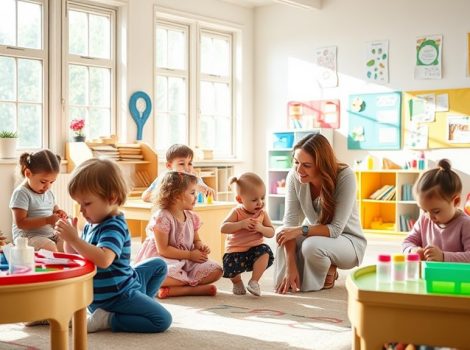Why Emotional Development in Early Childhood Matters More Than You Think!
Emotional development in early childhood is essential to your child’s future well-being. It lays the groundwork for healthy relationships, self-awareness, and effective communication. When children learn to identify and express feelings, they build skills that help them navigate social situations with confidence. This emotional intelligence enhances their ability to cope, which influences their mental health and resilience. Furthermore, emotional growth sets the stage for success in both academic and personal spheres. Supporting this vital phase can make a lasting difference. Keep exploring to uncover strategies that can help foster your child’s emotional journey.
Key Takeaways
- Emotional development fosters healthy relationships, promoting self-awareness and effective communication from an early age.
- Children with strong emotional skills can identify and manage their feelings, enhancing their understanding of others.
- Positive emotional experiences in childhood build resilience, leading to better stress management and coping mechanisms.
- High emotional intelligence in children correlates with greater academic success and healthier adult relationships.
- Modeling emotional expression and creating supportive environments encourage emotional exploration and growth in young children.
Understanding Emotional Development
Understanding emotional development in early childhood is essential for nurturing healthy relationships and self-awareness as children grow. During these formative years, children experience significant emotional milestones, including the ability to identify and express their feelings. You play a vital role in guiding them through this journey. By recognizing and responding to their emotional cues, you help them build a strong foundation for emotional intelligence.
Parental influence is paramount; your reactions to your child’s emotions shape how they perceive and manage feelings. For instance, when you validate their sadness or excitement, you teach them that it’s okay to express emotions. This validation encourages them to explore their feelings more deeply and fosters resilience.
Additionally, children learn empathy and social cues largely through observing your interactions. When you model healthy emotional responses, you not only enhance their emotional vocabulary but also inspire them to emulate those behaviors in their own relationships. As you nurture their emotional growth, you set the stage for future interpersonal skills, ensuring they develop into emotionally competent individuals. Understanding these dynamics empowers you to create an environment where emotional development thrives, ultimately benefiting both you and your child.
Impact on Social Skills
As children navigate their emotional development, their social skills naturally evolve alongside it. When you nurture their emotional intelligence, you’re laying a foundation for effective communication and relationship-building. Kids learn to identify and express their feelings, which helps them understand others’ emotions too. This awareness is essential for empathy building, allowing them to connect with peers on a deeper level.
As they practice recognizing their feelings, they also learn to interpret social cues, enhancing their ability to engage in conversations and resolve conflicts. These skills are important for making friends and creating lasting relationships. When children feel secure in their emotional landscape, they’re more likely to approach social situations with confidence and positivity.
Moreover, fostering emotional intelligence in early childhood equips children with the tools to navigate complex social dynamics. They become adept at understanding diverse perspectives, which not only enriches their interactions but also promotes inclusivity. In this way, emotional development isn’t just about understanding oneself; it’s about cultivating the skills that make meaningful connections possible. By investing in their emotional growth, you’re setting them up for social success now and in the future.
Effects on Mental Health
Emotional development in early childhood plays an essential role in shaping mental health, influencing how children cope with challenges and stressors. When children develop emotional resilience, they’re better equipped to handle life’s ups and downs, laying the foundation for their overall mental well-being.
Here are three key effects of emotional development on mental health:
-
Coping Skills: Early emotional experiences teach children how to manage their feelings and reactions during stressful situations, fostering healthy coping mechanisms.
-
Self-Esteem: Positive emotional development boosts self-esteem, helping children believe in their abilities and value themselves, which is critical for their overall mental health.
-
Social Connections: A child’s ability to express emotions and understand others’ feelings strengthens their social bonds, creating a support system that enhances their emotional resilience.
Recognizing the importance of emotional development can help you nurture a child’s ability to thrive emotionally and mentally. When you prioritize these early experiences, you’re not just shaping their childhood—you’re paving the way for a healthier, happier future.
Long-Term Success Factors
In the journey of childhood, emotional development lays the groundwork for long-term success factors that extend far beyond the early years. When you nurture emotional intelligence in your child, you’re equipping them with the ability to understand and manage their emotions. This skill is essential for forming healthy relationships, both personally and professionally, throughout their lives.
Moreover, resilience building during early childhood fosters an adaptable mindset. Children who learn to navigate challenges and setbacks develop a strong sense of self-efficacy. They become more likely to tackle obstacles with confidence and view failures as opportunities for growth.
These foundational skills contribute considerably to academic and career success later on. Children who possess high emotional intelligence and resilience are often better equipped to handle stress, collaborate effectively, and lead with empathy.
Strategies for Supporting Development
Building on the importance of emotional intelligence and resilience, there are several effective strategies you can implement to support your child’s emotional development. Creating nurturing environments and fostering playful interactions are key to helping your child thrive emotionally.
-
Model Emotional Expression: Show your child how to express feelings by talking about your own emotions. Use simple language and encourage them to do the same. This helps them understand and articulate their feelings.
-
Encourage Playful Interactions: Engage in imaginative play with your child. This not only nurtures creativity but also allows them to explore and express their emotions in a safe space. Play can be a powerful tool for emotional discovery.
-
Establish Routines: Consistent daily routines provide a sense of security. By knowing what to expect, your child can feel more at ease emotionally. Incorporate time for emotional check-ins during these routines to reinforce their feelings.
Frequently Asked Questions
How Do Parenting Styles Influence Emotional Development in Young Children?
Parenting styles shape your child’s emotional development. Authoritative parenting fosters emotional resilience and regulation, while permissive parenting can hinder social skills. Strong attachment styles emerge from balanced approaches, helping your child navigate relationships and emotions effectively.
What Role Does Play Therapy Have in Emotional Development?
Play therapy techniques transform simple play into profound healing. You’ll discover therapeutic benefits that help children express feelings, resolve conflicts, and develop emotional skills. It’s like a magic wand for their emotional growth and understanding!
Are There Specific Signs of Emotional Development Delays to Watch For?
You should watch for signs like difficulty expressing emotions, lack of interest in social interactions, or trouble understanding others’ feelings. Regular developmental assessments can help track emotional milestones and identify potential delays early on.
How Can Cultural Differences Impact Emotional Development in Children?
Cultural differences shape emotional expression and acceptance. You’ll notice that cultural norms influence how children show feelings, affecting their comfort with vulnerability. Understanding these variations helps you support their emotional development more effectively and empathetically.
What Are Common Myths About Emotional Development in Early Childhood?
You might believe emotional development’s just about crying, or that emotional intelligence isn’t essential until adulthood. Myth debunking reveals these notions are false; early emotional skills shape resilience, empathy, and social connections throughout life.



